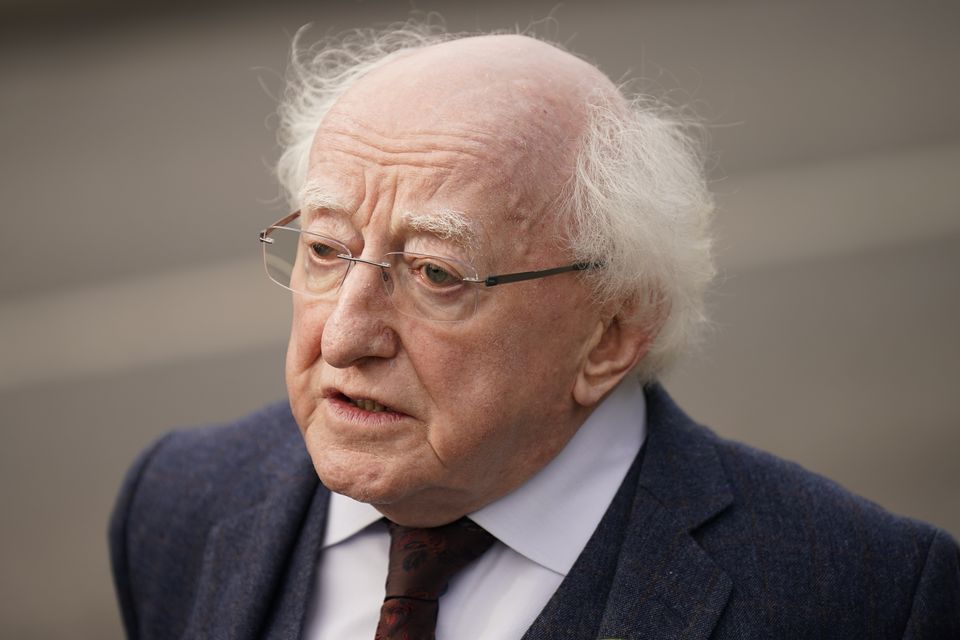President Michael D Higgins says silence ‘not morally acceptable’ as UN court orders Israel to allow more food ‘unhindered’ into Gaza
President Michael D Higgins. Photo: Niall Carson/PA
President Michael D Higgins has called on the international community to ensure the delivery of aid, a ceasefire and the release of all hostages in Gaza as he warned it is “not morally acceptable” for countries to remain silent.
The International Court of Justice (ICJ) has unanimously ordered Israel to take all necessary and effective action to ensure necessary supplies reach those in Palestine in order to prevent the spread of famine.
The court observed that Palestinians in Gaza “are no longer facing only a risk of famine” but that famine is “setting in”.
It comes as the United Nations Security Council voted this week to demand an immediate ceasefire and the unconditional release of all hostages.
In a statement, Mr Higgins said the latest ICJ order “cannot be ignored” and called on all countries to contribute to ensuring aid reaches Gaza, to the delivery of a ceasefire and the release of all hostages.
"Today's new order by the International Court of Justice that Israel ensure the unhindered provision at scale of urgently needed basic services and humanitarian assistance - including food, water and medicine - and open more land crossings in order to prevent the spread of famine and starvation cannot be ignored,” he said.
“It is now not morally acceptable that a single voice would be silent in the European Union or international community, all countries must do all that they can to ensure the immediate delivery of aid, a ceasefire and the release of all hostages in line with this week's UN Security Council resolution,” added the President.
Tánaiste Micheál Martin yesterday announced that Ireland will intervene in the case initiated against Israel under the Genocide Convention at the ICJ.
“As I said in the Dáil last month, intervention as a third party in a case before the International Court of Justice is a complex matter and is relatively rare,” Mr Martin said.
"Since 1948, only four other interstate cases have been initiated under the Genocide Convention before the International Court of Justice.
"Ireland intervened in one of these - the Ukraine v Russia case – and, after a rigorous and comprehensive process of analysis and consultation over the last six weeks, we have determined that we will do so again in the South Africa v Israel case.
“It is for the Court to determine whether genocide is being committed,” said Mr Martin.
"But I want to be clear in reiterating what I have said many times in the last few months; what we saw on 7 October in Israel, and what we are seeing in Gaza now, represents the blatant violation of international humanitarian law on a mass scale.
“The taking of hostages. The purposeful withholding of humanitarian assistance to civilians. The targeting of civilians and of civilian infrastructure. The indiscriminate use of explosive weapons in populated areas. The use of civilian objects for military purposes. The collective punishment of an entire population.
“The list goes on. It has to stop. The view of the international community is clear. Enough is enough. The UN Security Council has demanded an immediate ceasefire, the unconditional release of hostages and the lifting of all barriers to the provision of humanitarian assistance at scale. The European Council has echoed this call,” Mr Martin said.
“The situation could not be more stark; half the population of Gaza face imminent famine and 100pc of the population face acute food insecurity.
"As the UN Secretary General said as he inspected long lines of blocked relief trucks waiting to enter Gaza during his visit to Rafah at the weekend; ‘it is time to truly flood Gaza with life-saving aid. The choice is clear: surge or starvation’. I echo his words today.”
The top United Nations court on Thursday ordered Israel to take measures to improve the humanitarian situation in Gaza, including opening more land crossings to allow food, water, fuel and other supplies into the war-ravaged enclave.
The International Court of Justice issued two new so-called provisional measures in a case brought by South Africa accusing Israel of acts of genocide in its military campaign launched after the Oct. 7 attacks by Hamas. Israel denies it is committing genocide and accused South Africa of trying to “undermine Israel's inherent right and obligation to defend its citizens.”
Thursday’s order came after South Africa sought more provisional measures, including a cease-fire, citing starvation in Gaza. Israel, which had urged the court not to issue new orders, said it places no limits on aid entering Gaza and vowed to “promote new initiatives” to bring in even more assistance.
In its legally binding order, the court told Israel to take measures “without delay” to ensure “the unhindered provision” of basic services and humanitarian assistance, including food, water, fuel and medical supplies.
It also ordered Israel to immediately ensure that its military does not take action that could that could harm Palestinians' rights under the Genocide Convention, including by preventing the delivery of humanitarian assistance.
The court told Israel to report back in a month on its implementation of the orders.
The U.N. and international aid groups say deliveries have been impeded by Israeli military restrictions, ongoing hostilities and the breakdown of public order.
The Israeli Foreign Ministry accused South Africa of making “cynical attempts” to exploit the world court to undermine Israel’s right to self-defense and to win the release of remaining hostages. Israel says Hamas continues to hold some 100 hostages and the remains of 30 others either killed on Oct. 7 or who died in captivity.
“Israel will continue to promote new initiatives, and to expand existing ones, in order to enable and facilitate the flow of aid to the Gaza Strip ... despite the operational challenges on the ground and Hamas’ active and abhorrent efforts to commandeer, hoard and steal aid,” it added.
Israel has been working with international partners on a plan to soon begin deliveries of aid by sea.
Israel has repeatedly feuded with the United Nations, particularly UNRWA, the U.N. agency for Palestinian refugees and main provider of aid in Gaza. Israel accuses the agency of tolerating and even cooperating with Hamas — a charge UNRWA denies.
The court said in its order that “Palestinians in Gaza are no longer facing only a risk of famine ... but that famine is setting in." It cited a report from the United Nations Office for the Coordination of Humanitarian Affairs that said at least 31 people, including 27 children, have already died of malnutrition and dehydration.
Join the Irish Independent WhatsApp channel
Stay up to date with all the latest news















